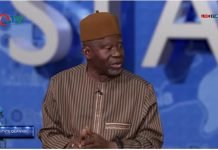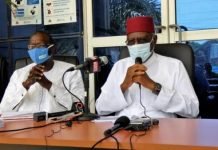By Modou S. Joof
Elections of any sort may attract controversies, and where the stakes are high, especially in national elections, disputes may arise, mostly from losing candidates and parties.
Gambians cast marbles on Saturday, December 4, 2021 to elect a president from six candidates including the incumbent, Adama Barrow.
The results of the vote are being transmitted and the winner is expected to be announced on Sunday, December 5.
If a candidate or a party felt they were cheated or that the voting process has not been free and fair, they can contest the results announced by the Gambia’s Independent Electoral Commission (IEC).
Here is what will happen if the presidential election results are contested:
Lawsuit
When the results are disputed, a lawsuit will be filed challenging the validity of the election.
Which Court has jurisdiction?
Section 127 of the 1997 Constitution provides the Supreme Court with the powers to adjudicate over matters arising from disputed presidential elections.
Section 127 subsection 1(c) states that “the Supreme Court shall have an exclusive original jurisdiction:
“On any question as to whether or not any person was validly elected to the office of President…”
Who can file a petition?
According to Section 49 of the 1997 Constitution, “any registered political party which has participated in the Presidential election or an independent candidate who has participated in such an election may apply to the Supreme Court to determine the validity of the election of a President by filing a petition…”
Such a petition should be filed with the Supreme Court (also referred to as the Constitutional Court in other jurisdictions) “within ten days of the declaration of the result of the election”.
What should the petition contain?
“The said petition must in paragraphs state the facts and grounds for the objection to the election results as announced by the Electoral Commission,” Barrister Muhammed Ndure, legal researcher, Judiciary of The Gambia, said.
“The petition should be accompanied by affidavits of statement and all relevant evidence or exhibits of the alleged mal-practice or the grounds for the objection.”
How many judges sit over the petition?
A panel of 5 judges of the Supreme Court will hear the petition and will make a verdict.
Would be respondents?
The IEC, the Attorney General and the winning candidate or party.
How long should the Court sit over the matter?
The Court is expected to hear the case and make a ruling within a reasonable time.
Such a case will be treated as urgent, but also the lawyer for the petitioner can file a “certificate of urgency” to allow for the process to be expedited, Barrister Ndure said.
Is the decision of the court final?
No. The five-panel decision can be reviewed if the petition is rejected by the Court.
“But first, the Court will decide whether or not the reasons advanced are worth a review. If the Court decides it’s not worth a review, it maintains its verdict,” according to Barrister Ndure.
“If the Court accepts the reasons advanced for a review, the Court will sit with a full panel of seven judges.”













